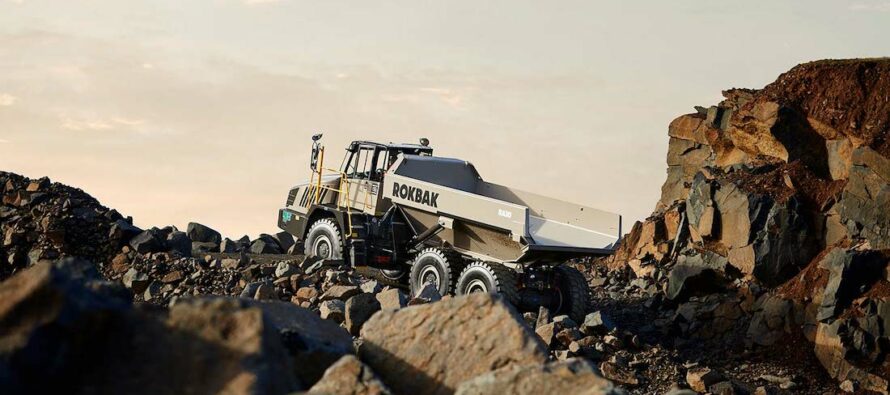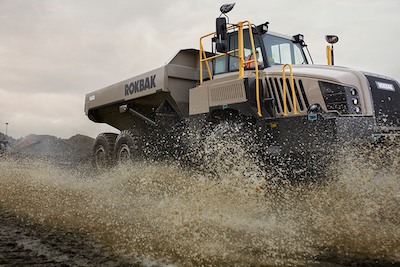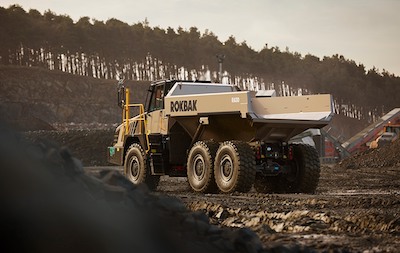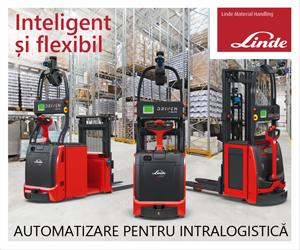Rokbak cold weather kits protect hauler productivity in low temperatures

Related Articles
By equipping their RA30 or RA40 articulated hauler with a Winter Kit or Arctic Kit, Rokbak customers can ensure optimum productivity and operator comfort even during extreme cold weather conditions.
As temperatures begin to drop across the Northern hemisphere, articulated hauler manufacturer Rokbak has announced two extreme cold weather protection kits for its RA30 and RA40 articulated haulers.
 “We have many customers operating in cold climates and despite the numerous challenges they face – from frostbite to fatigue failures – downtime is simply not an option. That’s why we developed these kits to deliver industry-leading performance, productivity and reliability from our haulers, whatever the conditions they have to withstand,” said Thomas Schmitt, Rokbak’s Customer Support Manager for Europe, Russia and CIS countries.
“We have many customers operating in cold climates and despite the numerous challenges they face – from frostbite to fatigue failures – downtime is simply not an option. That’s why we developed these kits to deliver industry-leading performance, productivity and reliability from our haulers, whatever the conditions they have to withstand,” said Thomas Schmitt, Rokbak’s Customer Support Manager for Europe, Russia and CIS countries.
The Winter Kit protects articulated haulers working for prolonged periods in temperatures down to -25°C (-13°F), while the Arctic Kit enables safe operation in temperatures as low as -40°C (-40°F).
In both kits, haulers are fitted with a thermo-heater, which springs into action when the engine is shut down, circulating coolant around the machines’ critical components. This engine-independent heater can keep a hauler’s vital organs at a set temperature for hours after the end of the working day, ensuring a fuss-free restart when it’s time to begin the next shift.
The technology employs an environmentally friendly start-stop system that consumes only very small amounts of diesel while contributing to lower non-productive fuel consumption, reduced engine wear and tear, and less downtime. This helps to minimize environmental impact and slash operating costs overall.
“Ensuring our haulers are always ready to work and can start up quickly in extreme cold is crucial to protecting customers’ productivity and profitability. The kits also make life more pleasant and comfortable for operators, who are likewise able to work more efficiently and productively,” Schmitt explained.
 Further advice for protecting productivity
Further advice for protecting productivity
In addition to an extreme cold weather protection kit, Schmitt also recommends Rokbak customers use arctic fuel with a maximum cloud point of 6°C (10°F) as standard diesel fuel is prone to gelling or waxing in cold weather. Users should carry out regular maintenance inspections too.
Cooling systems on Rokbak haulers, especially the coolant reservoir and hoses, should be inspected weekly throughout the winter. This does much more than simply stop the cooling system from freezing; it also increases the boiling point temperature, confines cavitation, averts corrosion, and lubricates shaft seals.
“Make sure the cooling system is adequately protected from the elements and that the coolant in the radiator is filled to the cap. In extremely low temperatures, the ratio of ethylene glycol antifreeze to water should be 60 to 40 to stop the water freezing and creating stress in the engine,” Schmitt explained.
Tyre inflation pressure, meanwhile, should be checked at least every two weeks, as well as for any cracking or chunking. Removing any debris, grease, or oil from the tires will also help minimize wear and prolong their life.
If a Rokbak hauler is being stored for an extended period over the winter, it should ideally be kept under cover or the tires should at least by protected from the elements by an opaque waterproof covering. The tires should also be blocked up so that the weight of the machine is not resting entirely on them. Batteries must also be stored where they will be protected from extreme temperatures – attempting to charge a frozen battery will often cause it to explode.
“Rokbak customers working in tough conditions don’t have to accept lower uptime. By installing the correct extreme cold weather protection kit for their needs and carrying out regular checks and maintenance, customers can continue working productively and profitably with the same levels of Rokbak reliability and performance throughout the year,” Schmitt concluded.






